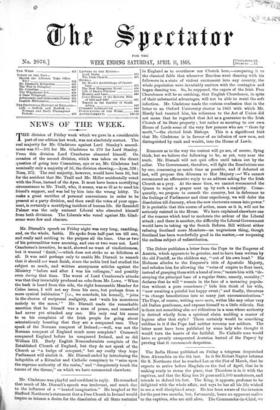Mr. Disraeli's speech on Friday night was very long, rambling,
and, on the whole, feeble. He spoke from half-past ten till one, and really said nothing to the purpose all the time. One or two of his personalities were amusing, and one or two were not. Lord Cranborne's invective, he said, showed no want of vindictiveness, but it wanted finish,'—which does not strike us as felicitous at all. It was said perhaps only to enable Mr. Disraeli to remark that it should not want finish, since the noble lord had studied the subject so much, and written anonymous articles against the Ministry "before and after I was his colleague," and possibly even during that time. The worst of Lord Cranborne's attacks was that they invariably produced an echo from Mr. Lowe. " When the bark is heard from this side, the right honourable Member for Caine issues, I will not say from his cave, but perhaps from a more cynical habitation " [i.e., we conclude, his kennel], " joins in the chorus of reciprocal malignity, and ' wails his monstrous melody to the moon.'" Mr. Disraeli made the remarkable assertion that he himself was a man of peace, and unassailed had never yet attacked any one. His only real hit seems to us his complaint of the Irish people for going about ostentatiously boasting that they are a conquered race. They speak of the Norman conquest of Ireland ;—well, was not the Norman conquest of England much more complete? Cromwell conquered England before he conquered Ireland, and so did William III. Burly English Nonconformists complain of the Established Church of England, but they do not speak of the Church as "a badge of conquest," but say coolly they hope Parliament will abolish it. Mr. Disraeli ended by introducing the hobgoblin of a Ritualist and Catholic conspiracy to " seize upon the supreme authority of the realm," and "dangerously touch the tenure of the throne," on which we have commented elsewhere.


































